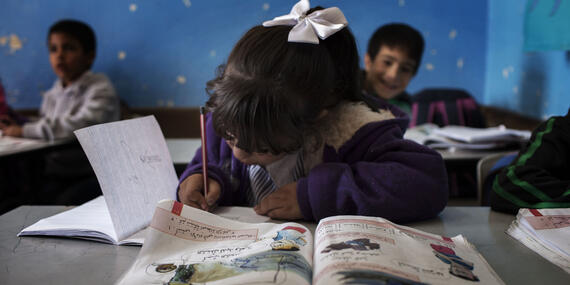Today's top news: Occupied Palestinian Territory, Sudan, Ukraine

Occupied Palestinian Territory
The United Nations Resident and Humanitarian Coordinator in the Occupied Palestinian Territory, Lynn Hastings, warned in a statement yesterday about the precarious situation for children as more than 1.3 million of them are returning to school in the West Bank, including East Jerusalem, and in the Gaza Strip this week and next.
In the first six months of the year, the UN recorded more than 423 incidents impacting Palestinian children and their education.
This includes Israeli Forces firing at schools and students, harassment by settlers and delays at checkpoints. This has affected approximately 50,000 children.
Three schools were demolished by the Israeli authorities in the last 12 months.
Physical barriers placed by Palestinians in refugee camps, some rigged with explosive materials, are also threatening the safety of children. And reports continue of children being enrolled in so-called summer camps by armed groups, increasing their risk of being exposed to violence or military content.
The statement also includes grim figures on child fatalities.
Since the beginning of the year, 42 Palestinian children have been killed, 35 in the West Bank, including East Jerusalem, and 7 in the Gaza Strip. And since the statement was issued yesterday, OCHA tell us that another child was killed today in the West Bank.
Six Israeli children have been killed since the beginning of the year.
All actors must comply with their obligations to protect children and prevent their exposure to all forms of violence. Safe access to education is a fundamental right of all children. They must be protected and safeguarded at all times by all parties.
Sudan
We are deeply concerned about the impact of renewed fighting in several parts of the country, including South Darfur and South Kordofan.
In South Darfur's state capital Nyala Town, at least 60 people have been killed and some 250 injured in recent clashes, according to the International Organization for Migration. As many as 50,000 people have fled the violence.
Meanwhile, ongoing fighting has prevented trucks carrying urgently needed humanitarian relief to reach Nyala Town.
And in Kadugli Town, the capital of South Kordofan State, our humanitarian partners report that the food stocks have been almost completely depleted. Renewed clashes have driven some 6,700 people from their homes to other neighbourhoods, according to preliminary reports from IOM.
We call on the parties to the conflict in Sudan to cease hostilities and allow for the delivery of life-saving assistance to civilians in need.
OCHA’s director of Operations and Advocacy Division, Edem Wosornu also briefed Member States in Geneva yesterday on the latest situation in Sudan.
Ms. Wosornu said that immediate and comprehensive action is required to prevent Sudan’s humanitarian catastrophe from becoming even more devastating.
She noted that just over a quarter of the US$2.6 billion required for the humanitarian response this year has been received.
Ukraine
We and our partners have just launched an initiative appealing for $268 million to be able to support more than 1.3 million people with specific assistance in the coming winter months.
The war has severely damaged homes, energy, water, and gas infrastructure, putting millions at extreme risk during the cold season which, in Ukraine, normally starts in October running through March. Temperatures can drop as low as -30 degrees Celsius.
For this winter, the we and our partners will prioritize emergency repairs to homes in the front-line communities and provide clothes, heating appliances and other winter supplies. We also prioritize repairs in displacement centres and financial aid to displaced people to ensure they can pay rent or utility bills. Aid organizations will also help with repairs to ensure municipal heating systems are up and running.
The response will build on efforts made during the last winter, when humanitarian organizations reached 2.2 million people with similar services and distributed over 4,000 generators amidst a severe energy crisis.
